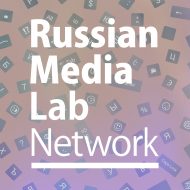From 1 September Olga Dovbysh has joined the Russian Media Lab team as a postdoctoral researcher. She will join the current project on Russian media and freedom of expression. 
Can you tell a bit about yourself and your research?
I am from Russia, where I have been working since 2013 at Higher School of Economics in Moscow. Earlier, I graduated from the master’s program “Media management” from The Royal Institute of Technology in Stockholm. In Moscow I’ve been lecturing and running seminars in both English and Russian languages in media studies.
In 2018 I defended my dissertation in sociology. It was an interdisciplinary research lying at the intersection of economic sociology and media studies. I studied how the structure of Russian regional media market changed after the transformation of links between state authorities and media outlets. Firstly, I explored the processes that led to this transformation. Among them are (1) changes in national media policy aimed at further commercialization of media outlets (it was implemented by the repeal of three laws that regulated economic support of regional mass media); (2) poor development and high disproportion of regional advertising market; (3) desire of regional authorities to control regional media landscape without participation in media capital.
In the dissertation, I reveal that in the beginning of 2000’s a new institutional form of state-media relations was formed – state informational contracts. In short, state informational contracts are an instrument that allows local authorities to act as market actors: they “order” coverage of a certain topic and pay media outlets for this service. In reality, it turns on many additional meanings. Being important financing source, state informational contracts in fact make regional media outlets dependent on this relatively easy money. As a result, mechanisms of self-censorship and self-control work – media outlets control themselves and demonstrate loyalty in order to get such contracts in the future. Moreover, state informational contracts influence the editorial policy of regional media outlets. Acting as market actors, media outlets tend to publish (or broadcast) content to attract more audience (and sell it to advertisers), while public-oriented content goes as contractual content.
State informational contracts are quite stable element of Russian regional media market since it is rooted in previous logics and patterns of development of media in Russia. Among them are inevitability of state support for regional and local media, strong public orientation of regional journalists, and clientelistic nature of regional journalism. Studying distribution of state contracts as quasimarket process, I revealed high disproportion between those who got contracts. As a rule, in all regions 2–3 media outlets get the majority of the contracts (often these companies have personal connections to those who give contracts), so it is quite far from market competition. In fact, we observe an interesting tendency when commercialization of regional media market transforms but saves such things as state control and state support of regional media in Russia.
What research project(s) are you working on?
Now I continue my research on regional and local media in Russia, while the main focus is on changes that have occurred due to digitalization and internetization of Russian regions. In particular, I study how online media, so-called “hyperlocal media”, transforms regional media landscape in Russia. I’d formulate my research problem as “how does the notion of ‘local media’ expand in digital age and how does the hyperlocal media influence the independence and freedom of local media in Russian regions?” This research is based on the materials of field work – interviews with local media professionals (editors, journalists) and representatives of hyperlocal media (bloggers, administrators of groups in social networks etc.). I have already collected data from 4 Russian cities and towns and 2 more will be added this autumn.
Also, I continue my research on forms of state financing of Russian media. In October I’m going to attend RIPE 2018 conference to present my study of public service content in a neo-authoritarian media system like Russia.
In another project, in which I perform together with Julia Person from Erfurt University, is the research of strategies of content localization of international glossy magazines in Russia. Based on interviews with Russian editors of international glossy magazines, we explore how content of these magazines is localized or adapted to fit the Russian audience.
What are your future plans?
I think I’ll continue my research on regional and local media markets and media systems in hybrid political regimes. There are many research questions to answer in these areas. For instance, I’d like to explore more the role of social media platforms and messengers as sources of local information and new actors of Russian media market.
